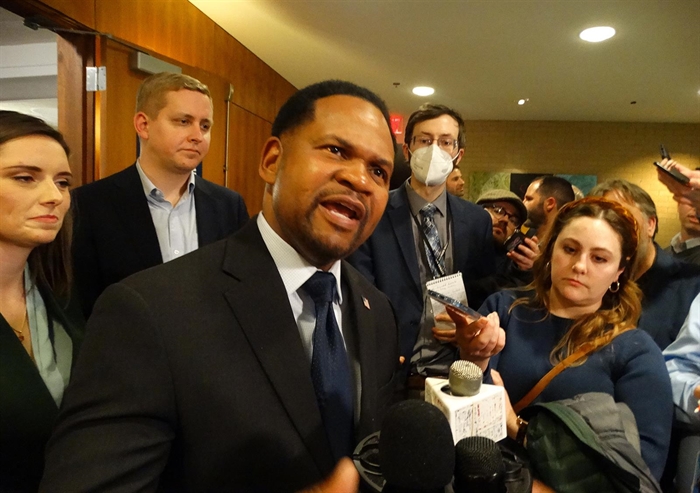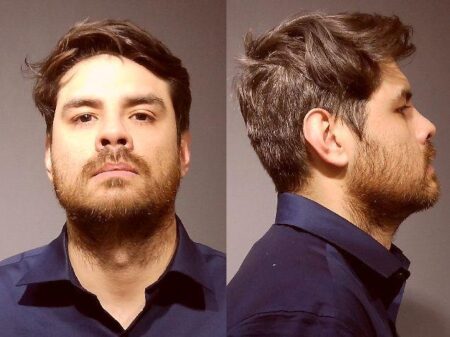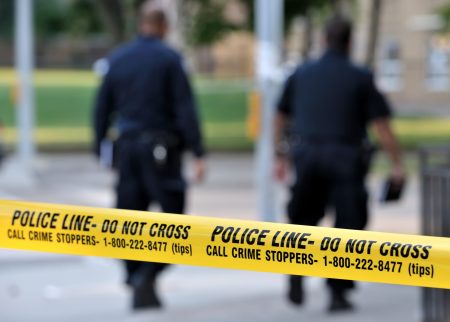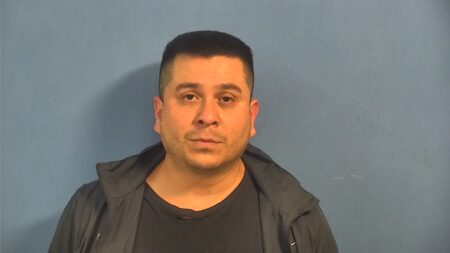By JERRY NOWICKI
Capitol News Illinois
Things got a bit chippy Thursday night when the six Republican candidates took the stage together for the first time for a debate in Chicago.
For the most part, candidates aimed criticisms at the man who has recently had a slight polling lead, Aurora Mayor Richard Irvin.
Darren Bailey, a state senator from Xenia best known for challenging Gov. JB Pritzker’s COVID-19 executive orders in court, repeated claims about “pay to play” politics in Irvin’s Aurora that have shown up in attack ads.
“I’m not interested in defeating you just because you’re a Democrat,” Bailey, who polling has shown trailing Irvin by about five points, said. “I’m interested in defeating you because you are a corrupt Democrat.”
Irvin responded with attack ad fodder of his own, saying that Bailey had a mask mandate on his Bailey Family Farm, which, Irvin said, “bussed in” workers from other countries.
The Bailey Family Farm hired migrant workers in 2021 and required masks for some employees, according to an April report from WTTW-TV in Chicago. The Bailey attack on Irvin was based on 2018 reporting from the Aurora Beacon-News that was headlined, “Donors that gave thousands to Aurora mayor get high-profile projects.”
While Irvin again said it would be “irresponsible” to comment on a leaked Supreme Court decision that could overturn the abortion precedent Roe v. Wade – mirroring almost identically several previous exchanges with reporters – other candidates outlined more hardline anti-abortion stances.
When given an opportunity at a rebuttal on the abortion topic, Irvin went into a talking point about handouts.
“I know many of my opponents here on the stage are attacking me and I understand. I get it, you know, they’re threatened by the fact that I’m violating their political aspirations and I’m hurting their political aspirations,” Irvin said.
As he talked about handouts, candidate Gary Rabine, founder of a suburban paving company, interjected that Irvin wouldn’t answer the question. Bailey called Irvin a “great impostor.”
At another point, Bailey and Rabine, talking over each other, argued about which man had done more to oppose COVID-19 mandates. Bailey then talked over former state Sen. Paul Schimpf, who said he supported Bailey’s initial lawsuits against COVID-19 mandates in Clay County.
Bailey sued claiming the governor exceeded his authority in issuing stay-at-home orders and had an initial win in Clay County before that ruling was overturned in a Sangamon County appellate court.
Bailey later went as far to say that “the worst thing” for Illinois, rather than another Pritzker term, “would be to have the wrong Republican in office.”
Policy-wise, the candidates didn’t say much beyond what they’d stated in past debates, which we covered in depth previously. As at previous debates, much of the discussion centered on crime and guns.
Money matters: The tension between the candidates was not surprising, considering the tens of millions of dollars being funneled into attack ads across all media, mainly by three of the state’s wealthiest men – Pritzker, Ken Griffin and Richard Uihlein.
This week, Irvin reported another $5 million received from Griffin, a GOP megadonor and founder of the hedge fund Citadel, bringing his total received from Griffin to $50 million.
Bailey, meanwhile, reported another $3 million from Uihlein, another megadonor and founder of the shipping supply company Uline, bringing his total received from Uihlein to more than $9 million. Uihlein has also donated over $8 million to the People Who Play by the Rules political action committee, which has funded advertising against Irvin as well.
Pritzker, meanwhile, has given his campaign $125 million since March 2021, having invested more than $300 million in the JB for Governor committee since he announced his run in 2018.
Schimpf, who was recently polling in single digits but received the endorsement of the Chicago Tribune, criticized Irvin’s use of his mega millions to attack the field.
“Folks, stuff never seems to change in Illinois. The candidates come and go, but things stay the same,” he said. “And that’s because it’s the same megadonors, the same political operatives, it’s the same special interest groups. I’m not beholden to any of those.”
Sullivan, who participated remotely due to a positive COVID-19 diagnosis, said Irvin’s “only strength” was “a whole lot of money.”
Spending tracking numbers shared by the Irvin campaign showed his campaign has spent $14.3 million as of the end of May, while Bailey has spent $4.6 million and Petersburg venture capitalist Jesse Sullivan has spent about $2 million.
The People Who Play by the Rules PAC, meanwhile, has spent about $3.2 million and the Democratic Governors Association has spent over $9 million, according to the Irvin campaign analysis. The DGA, which has received money from Pritzker in the past, has funded ads attacking Irvin and touting Bailey’s record as “too conservative.”
Family feud: Irvin also counted among his donations a $4,150 sum from Jennifer Pritzker, a cousin to the governor and retired lieutenant colonel from the Illinois Army National Guard. She previously donated $800,000 to a group opposing the governor’s favored graduated tax amendment and was a funder of ex-Gov. Bruce Rauner’s campaign in 2014, but not his reelection campaign against Pritzker.
She also donated hundreds of thousands of dollars to President Donald Trump’s 2016 campaign but financially backed Biden to a lesser scale in 2020.
Both Pritzkers inherited much of their wealth from their family, which founded the Hyatt hotel chain, although JB was successful in venture capital and private equity prior to running for Governor.
Pritzker was asked about Jennifer, who is transgender, at an unrelated news conference regarding LGBTQ equity, saying he was proud to stand up and support her.
“Even though she is a Republican and has been her whole life and continues to be a Republican, she also has really good heart and is someone who cares deeply about the people of this city and the people of this state,” he said.
jnowicki@capitolnewsilllinois.com








